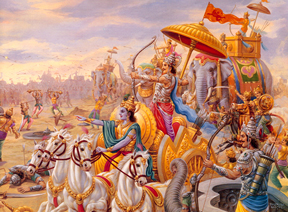 In the previous article (Gods, Souls and Maya are eternal entities) we learned that our true identity is the soul, and the soul is eternal and indestructible.
In the previous article (Gods, Souls and Maya are eternal entities) we learned that our true identity is the soul, and the soul is eternal and indestructible.
Shree Krishna convinces Arjun to fight the war
As previously discussed (see Chapter 1, Part 8), it was clearly Arjun’s duty to fight the war. So Shree Krishna tells him that if he does his duty, then he can’t lose: if he fights the war and is killed, then he will be rewarded with entry to swarg; and if he fights the war and wins, then he will enjoy the sovereignty of the earth (chapter 2, verse 37). According to the law of karm, he will be rewarded whether he wins or loses the actual war, because he chose to do the right thing.
But if, choosing not to fight, he shirks his duty, he will incur sin which will bring suffering upon him in the next life. In addition, people will see him as a coward because they will assume that he left the battlefield out of fear. He would lose the respect of other warriors. Thus, ruining his good name and bringing infamy upon himself, he would spoil his happiness in this life; and by incurring the sin of ignoring his duty, he would also spoil his happiness in the next life.
Shree Krishna thus explained in simple, straightforward logic why Arjun should fight the war.
The Futility of Worldly Happiness
Shree Krishna Himself had already explained the futility of worldly happiness to Arjun earlier in chapter 2. He explained that the world is full of pairs of opposites, like heat and cold, and pleasure and pain. In other words, cold doesn’t last forever – it eventually gives way to heat; and heat doesn’t last forever – it eventually gives way to cold.
Pleasure doesn’t last forever – it eventually gives way to pain; and pain doesn’t last forever – it eventually gives way once again to pleasure (chapter 2, verse 14). All situations are temporary, which means that worldly happiness is always fleeting. Thus, Shree Krishna advised Arjun to remain equanimous both in situations that bring pleasure and in those that cause pain.
A fact or truth is permanent, unchanging, and everlasting. Worldly happiness on the other hand exists only as a fleeting experience in our mind, not as a substantial and real thing. We cannot enjoy anything in this world unceasingly. The longer we go on enjoying it, the more the enjoyment fades, until it finishes altogether.
The truth is that there never was any happiness in those worldly things: not in the tasty food, not in the beauty, not in anything of this world. We experience happiness in the association of those things in proportion to our desire for them.
The hungrier we are, the better food tastes, and the more pleasure we receive in eating it. The thirstier we are, the more we enjoy water. The longer we have been separated from the object of beauty, the greater our desire for it has grown, and the greater the pleasure we receive upon meeting with it.
But as we go on eating, our desire for food wanes, and the happiness we experience in eating decreases accordingly. As we go on drinking, our thirst is quenched, and our pleasure in drinking the water also disappears. The longer we go on looking at a beautiful thing, whether it is a person, or a painting, or any natural scene, the more accustomed to that thing we become, and the less desire we have to keep looking at it. Eventually, we become bored, and we want to look at something else.
When we reach such a threshold, if we were forced to continue, then the very thing that initially gave us pleasure, would now start giving us displeasure. If we were forced to keep on staring at the same beautiful face or painting for hours on end, we would get fed up and not want to look at it anymore. If there was real happiness in these things, then how could we receive pain from the very same things?
If there was real happiness in any object or person of this world, then everyone would be able to get the same amount of enjoyment out of the same person or thing. Everyone would love chocolate and hate onions. But there is no consistency: some people love onions and hate chocolate.
Everyone would feel the same happiness in seeing your son as you do. But they don’t; you receive the happiness from your son, because you are attached to him. Your neighbor is not attached to him, so he is neutral towards him. He gets happiness from his own son, not your son. Thus, we see that the so-called happiness is received based on the attachment of the mind, not based on the existence of happiness in that person or thing.
The next question is: if there is no real happiness in this world, then is there only pain? We will see what the philosophy of the Gita has to say about this in the next article.
Disciple of Shree Kripaluji Maharaj:
Swami Nikhilanand Ji is a Canadian born Hindu spiritual leader based in Austin, Texas. He is a sanyasi disciple and pracharak of Jagadguru Shree Kripaluji Maharaj.
Attracted to the teachings of Hinduism from a young age, Swamiji eventually let his deep spiritual longing lead him to India, where he was most fortunate to come under the guidance of Shree Kripaluji Maharaj. Thereafter, living in the ashrams of JKP, he extensively studied Hindi, the philosophy of the prime Sanskrit scriptures (Vedas, Darshan Shastras, Gita, Bhagwatam), and practiced meditation in the tradition of raganuga bhakti. In 2003, he was given sanyas.
Now, with the blessings of his Guruji, he offers satsang programs throughout America, engaging audiences with his clear explanations of Hindu philosophy coupled with inspired chanting of Sanskrit mantras and shlokas and charming nam sankirtan. His informative and compelling speeches provide practical insight into how to adopt the teachings of Sanatan Dharm into our daily lives, and inspire us to awaken our inner spiritual potential.
To stay in touch with Swami Nikhilanand Ji, like his Facebook page at https://www.facebook.com/SwamiNikhilanand or follow him on twitter at https://twitter.com/Swami_Nikhil.
Swami Nikhilanand






